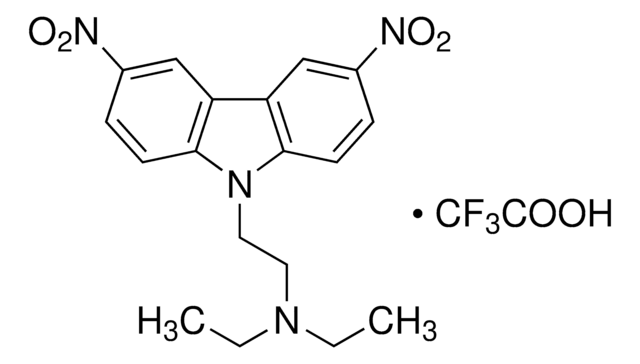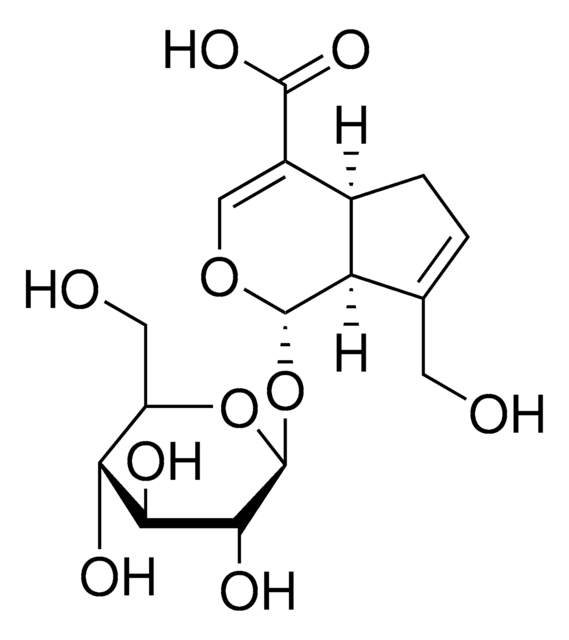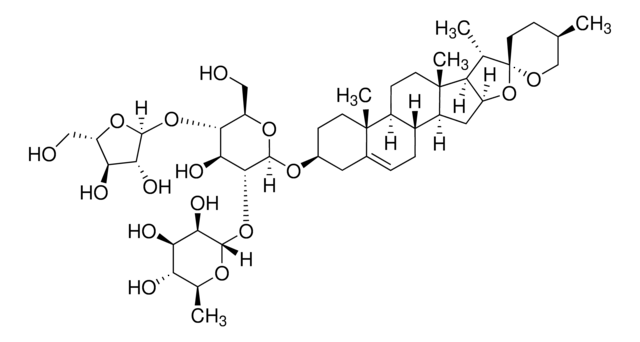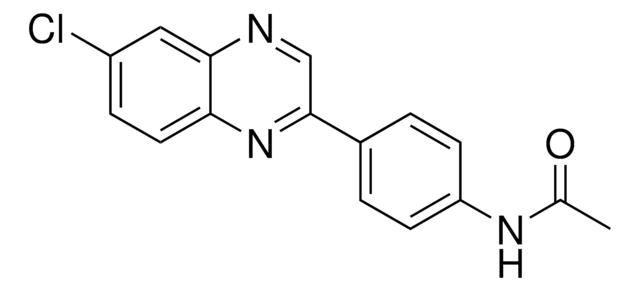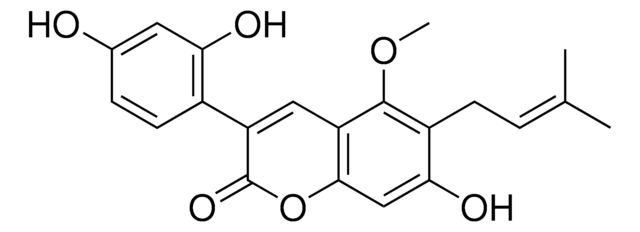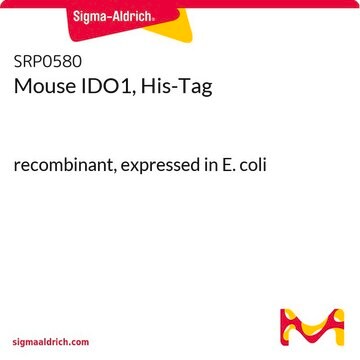SML2634
QX77
≥98% (HPLC)
Sinónimos:
N-(4-(7-Chloro-2H-benzo[b][1,4]oxazin-3-yl)phenyl)acetamide, N-[4-(7-Chloro-2H-1,4-benzoxazin-3-yl)phenyl]acetamide, QX 77, QX-77
Iniciar sesiónpara Ver la Fijación de precios por contrato y de la organización
About This Item
Fórmula empírica (notación de Hill):
C16H13ClN2O2
Número de CAS:
Peso molecular:
300.74
Número MDL:
Código UNSPSC:
12352200
NACRES:
NA.77
Productos recomendados
Análisis
≥98% (HPLC)
formulario
powder
color
white to beige
solubilidad
DMSO: 2 mg/mL, clear
temp. de almacenamiento
2-8°C
Acciones bioquímicas o fisiológicas
QX77 is a chaperone-mediated autophagy (CMA) activator derived from the atypical retinoid AR7 that activates CMA by antagonizing retinoic acid receptor-α (RARα) signaling. QX77 rescues defective trafficking & lysosomal localization of the CMA receptor LAMP2A in cystinotic Ctns-/- MEFs and CTNS-KO human proximal tubule cells (PTCs) by restoring Rab11 expression and Rab11-positive vesicles trafficking to the level seen in wild-type cells (20 μM, 48 hrs). CMA activation by QX77 treatment (20 μM, 5 days) also significantly reduces toxic α-synuclein (α-syn) accumulation in PD patients iPSCs-derived astrocytes with LRRK2 G2019S mutation.
Código de clase de almacenamiento
13 - Non Combustible Solids
Clase de riesgo para el agua (WGK)
WGK 3
Punto de inflamabilidad (°F)
Not applicable
Punto de inflamabilidad (°C)
Not applicable
Certificados de análisis (COA)
Busque Certificados de análisis (COA) introduciendo el número de lote del producto. Los números de lote se encuentran en la etiqueta del producto después de las palabras «Lot» o «Batch»
¿Ya tiene este producto?
Encuentre la documentación para los productos que ha comprado recientemente en la Biblioteca de documentos.
Jaime Anguiano et al.
Nature chemical biology, 9(6), 374-382 (2013-04-16)
Chaperone-mediated autophagy (CMA) contributes to cellular quality control and the cellular response to stress through the selective degradation of cytosolic proteins in lysosomes. A decrease in CMA activity occurs in aging and in age-related disorders (for example, neurodegenerative diseases and
Angelique di Domenico et al.
Stem cell reports, 12(2), 213-229 (2019-01-15)
Parkinson's disease (PD) is associated with the degeneration of ventral midbrain dopaminergic neurons (vmDAns) and the accumulation of toxic α-synuclein. A non-cell-autonomous contribution, in particular of astrocytes, during PD pathogenesis has been suggested by observational studies, but remains to be
Jinzhong Zhang et al.
The Journal of biological chemistry, 292(25), 10328-10346 (2017-05-04)
The lysosomal storage disease cystinosis, caused by cystinosin deficiency, is characterized by cell malfunction, tissue failure, and progressive renal injury despite cystine-depletion therapies. Cystinosis is associated with defects in chaperone-mediated autophagy (CMA), but the molecular mechanisms are incompletely understood. Here
Jinzhong Zhang et al.
Frontiers in endocrinology, 10, 21-21 (2019-02-19)
Cystinosis is a lysosomal storage disorder caused by defects in CTNS, the gene that encodes the lysosomal cystine transporter cystinosin. Patients with nephropathic cystinosis are characterized by endocrine defects, defective proximal tubule cell (PTC) function, the development of Fanconi syndrome
Nuestro equipo de científicos tiene experiencia en todas las áreas de investigación: Ciencias de la vida, Ciencia de los materiales, Síntesis química, Cromatografía, Analítica y muchas otras.
Póngase en contacto con el Servicio técnico
